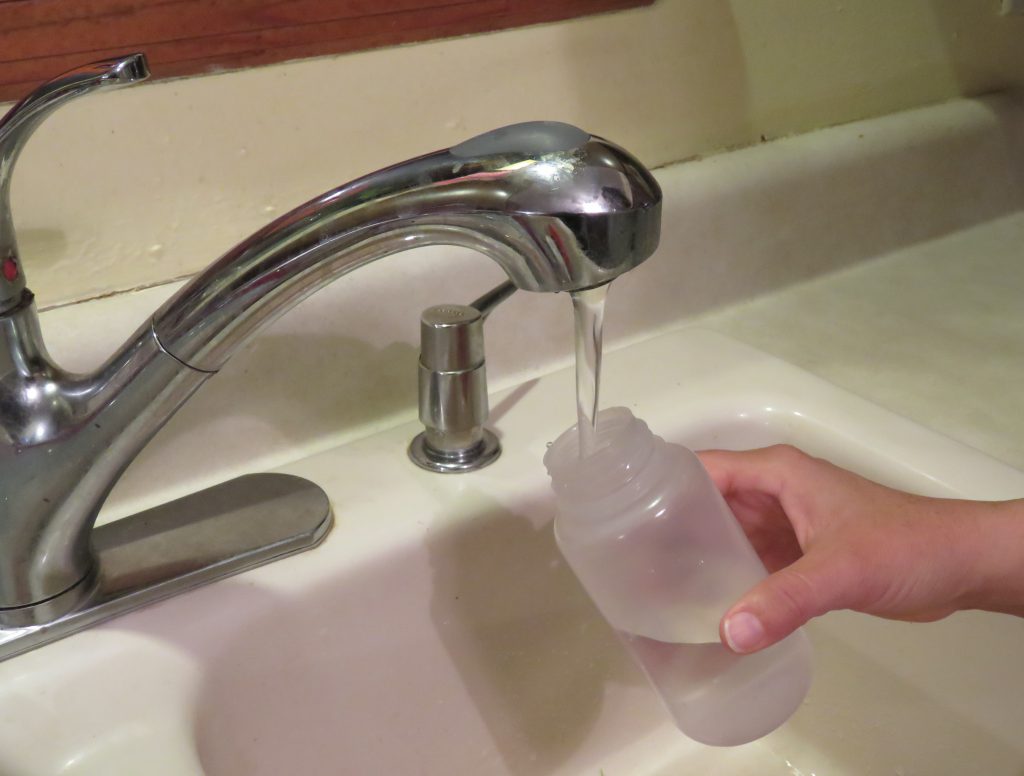
Contact you local county health department office for information on how to test your well water. Image: F. Alvarado Arce
Residents that rely on private wells for home consumption are responsible for ensuring the safety of their own drinking water. The Florida Department of Health (FDOH) recommends private well users test their water once a year for bacteria and nitrate.
Unlike private wells, public water supply systems in Florida are tested regularly to ensure that they are meeting safe drinking water standards.
Where can you have your well water tested?
Your best source of information on how to have your water tested is your local county health department. Most health departments test drinking water and they will let you know exactly what samples need to taken and ho w to submit a sample. You can also submit samples to a certified private lab near you.
Contact information for county health departments can be located at: http://www.floridahealth.gov/programs-and-services/county-health-departments/find-a-county-health-department/index.html
Contact information for private certified laboratories are found at https://fldeploc.dep.state.fl.us/aams/loc_search.asp
Why is it important to test for bacteria?
Labs commonly test for both total coliform bacteria and fecal coliforms (or E. coli specifically). This usually costs about $25 to $30, but can vary depending on where you have your sample analyzed.
- Coliform bacteria are a large, diverse group of bacteria and most species are harmless. But, a positive test for total coliforms shows that bacteria are getting into your well water. They are used as indicators – if coliform bacteria are present, other pathogens that cause diseases may also be getting into your well water. It is easier and cheaper to test for total coliforms than to test for a suite of bacteria and other organisms that can cause health problems.
- Fecal coliform bacteria are a subgroup of coliform bacteria found in human and other warm-blooded animal feces, in food and in the environment. E. coli are one group of fecal coliform bacteria. Most strains of E. coli are harmless, but some strains can cause diarrhea, urinary tract infections, and respiratory illnesses among others.
To ensure safe drinking water, FDOH strongly recommends disinfecting your well if the water tests positive for (1) only total coliform bacteria, or (2) both total coliform and fecal coliform bacteria (or E. coli). Disinfection is usually done through shock chlorination. You can either hire a well operator in your area to disinfect your well or you can do it yourself. Information for how to shock chlorinate your well can be found at http://www.floridahealth.gov/environmental-health/private-well-testing/_documents/well-water-facts-disinfection.pdf
Why is it important to test for nitrate concentration?
High levels of nitrate in drinking water can be dangerous to infants, and can cause “blue baby syndrome” or methemoglobinemia. This is where nitrate interferes with the blood’s capacity to carry oxygen. The Maximum Contaminant Level (MCL) allowed for nitrate in drinking water is 10 milligrams nitrate per liter of water (mg/L). It is particularly important to test for nitrate if you have a young infant in the home that is drinking well water or when well water is used to make formula to feed the infant.
If test results come back above 10 mg/L nitrate, use water from a tested source (bottled water or water from a public supply) until the problem is addressed. Nitrates in well water can come from fertilizers applied on land surfaces, animal waste and/or human sewage, such as from a septic tank. Have your well inspected by a professional to identify why elevated nitrate levels are in your well water. You can also consider installing a water treatment system, such as reverse osmosis or distillation units to treat the contaminated water. Before having a system installed, contact your local health department for more information.
In addition to once a year, you should also have your well water tested when:
- The color, taste or odor of your well water changes or if you suspect that someone became sick after drinking well water.
- A new well is drilled or if you have had maintenance done on your existing well
- A flood occurred and your well and/or septic tank were affected
Remember: Bacteria and nitrate are not the only parameters that well water is tested for. Call your local health department to discuss your what they recommend you should get the water tested for, because it can vary depending on where you live.
FDOH maintains an excellent website with many resources for private well users at http://www.floridahealth.gov/environmental-health/private-well-testing/index.html, which includes information on potential contaminants and how to maintain your well to ensure the quality of your well water.
- What to Do if a Sinkhole Opens on Your Property? - June 6, 2025
- Workshop on Private Well and Septic System Basics - October 18, 2024
- Septic system maintenance after a flood - June 7, 2024
